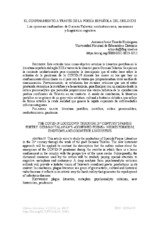El confinamiento a través de la poesía española del siglo XXI: Los «poemas confinados» de Germán Talaván: neohistoricismo, emociones y lingüística cognitiva
The covid-19 lockdown through 21st century spanish poetry. German talaván’s «confined poems»: neohistoricism, emotions and cognitive linguistics
Autor
Tinedo Rodríguez, Antonio Jesús
Editor
UCOPressFecha
2021Materia
Literatura pestíferaMetáfora
Crítica psicoanalítica
Neohistoricismo
Pandemia
Plague literature
Metaphor
Psychoanalytic
Criticism
New historicism
Pandemics
METS:
Mostrar el registro METSPREMIS:
Mostrar el registro PREMISMetadatos
Mostrar el registro completo del ítemResumen
Este artículo tiene como objetivo estudiar la literatura pestífera en la literatura española del siglo XXI a través de la obra del poeta Germán Talaván. Se aplicará la corriente neohistoricista para contrastar la descripción que el autor hace sobre la eclosión de la pandemia de la COVID-19 durante los meses en los que hay un confinamiento domiciliario en el país con la visión que proporcionaban otros medios de comunicación. Posteriormente, se estudiarán los recursos retóricos que usa el autor prestando atención a la metáfora y a la metonimia, para finalizar con un análisis desde la crítica psicoanalítica que permitirá proporcionar una visión holística de la «producción poética confinada» de Talaván en su contexto. A modo de conclusión, la literatura pestífera es un género de un gran valor artístico, cultural e histórico debido a que refleja de forma artística la cruda realidad que genera la rápida expansión de enfermedades infectocontagiosas. This article aims to study the production of Spanish Plague Literature in the 21st century through the work of the poet Germán Talaván. The new historicist approach will be applied to contrast the description that the author makes about the emergence of the COVID-19 pandemic during the months in which there is a home confinement in the country with the perspective of the mass media. Subsequently, the rhetorical resources used by the author will be studied, paying special attention to cognitive metaphors and metonymy. A deep analysis from psychoanalytic criticism outlook will provide a holistic vision of Talaván's «confined poetic production» in its context. In conclusion, plague literature is a genre of great artistic, cultural and historical value because it reflects in an artistic way the harsh reality that generates the rapid spread of infectious diseases.

